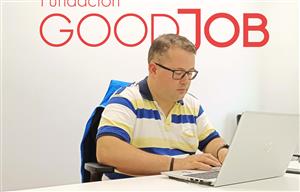Search Results
Search
Filter results
Advanced Filters
Your search returned 141 Solutions
-

Company- and volunteer-based vocational training model for creating inclusive jobs in the IT sector
Fundación GoodJob's #IMPACT Program: Launched in 2020 for technological and vocational training online for persons with disabilities. By the end of 2022, 518 people participated, achieving an employment rate of over 70%.
#IMPACT, Spain